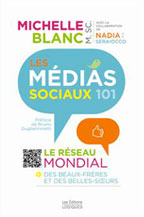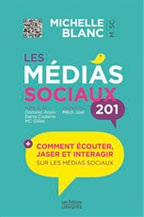La culture du mépris sur le web
C’est en lisant les billets de Marine Le Breton (Une étude fait un lien entre jeux vidéo et culture du viol) ou de Jocelyne Robert (Oui, nous vivons dans une culture du viol) que je songe de plus en plus à ce « nouveau cool » qui est en fait la culture du mépris.
Oui il y a bien nos faiseurs de troubles locaux qui s’amusent à mépriser bien des gens, sous le couvert de « ce sont des matantes, gaies, ne connaissent pas le web, vous n’êtes pas une femme, tu es fourables, tu a/es whatever » ridiculisent, diffament ou méprisent. Mais le phénomène de la méchanceté sur le Web (ou de la connerie qui alimente la culture du mépris) est réellement mondial. Pour vous en convaincre, regardez ce petit clip de l’américain Bill Maher qui fait une sortie contre la méchanceté gratuite sur Twitter et qui n’en revient pas qu’on puisse dire à une usine de gâteau carotte, d’aller se faire foutre.
Dans un article de Esquire There Are No Saints Online …but the Internet will be cleaned up yet, on peut lire :
The Internet has reached peak hate. It had to. At every other moment in history when there has been an explosion of text — whether through social change, like the birth of a religious movement, or technological change, like the advent of print — a period of nasty struggle ensued before the forces of civility reined it in. In the past few months alone, we’ve seen the catfishing of Manti Te’o, a professional tennis player quit because of trolling, and a rash of teenage suicides from cyberbullying alongside the by-now-standard Twitter hatestorms of various strengths and durations. The sheer bulk of the rage at the moment can seem overwhelming. But the fact that we recognize it and have acknowledged its unacceptability is a sign of the ancient process reasserting itself yet again. The Internet is in the process of being civilized.
Et
The change in tone is coming because the cost of hate is becoming clearer. The research on the psychological effects of bullying has become much starker in its analysis recently. In February, a long-term study published in the Journal of the American Medical Association Psychiatry established that bullies and their victims both have a higher rate of mental illness for decades afterward.
Ce tableau d’Esquire est aussi très révélateur.
Au Canada, selon mediasmarts.ca, nos lois ne sont pas encore adaptées à la réalité de la culture du mépris sur le web.
When hatred is determined to have been an inciting factor in a crime, penalties are increased. But the appropriateness of applying legislation meant for offline hatred to online hatred is debatable. The number of different laws which might be applied to online hate can lead to conflicting conclusions about the definition of hateful behaviour and freedom of expression; further, considerable debate exists over which types of speech should be subject to these laws at all.
Sur ce site j’y note aussi (ce que je savais déjà pour le vivre intensément depuis plusieurs années déjà) que
Transgender and transsexual individuals are also disproportionately targeted by hate groups. Bisexuals are targeted by hate groups less frequently, although this is partially due to a higher unwillingness by bisexual populations to report crimes due to fear of reprisal. Not surprisingly, there is a close connection between hate and cyberbullying: for example, lesbian, gay, bi-sexual and transgender (LGBT) youth are almost twice as likely to report having been bullied online.
Je ne suis donc pas sortie du bois.
De l’autre côté de l’Atlantique, même le polémique Beigbeder lance un truculent « Internet, c’est l’empire de la méchanceté, de la bêtise ».
Mais pour vous faire rire un peu (et pour un peu dédramatiser la chose, même si c’est un problème endémique) lisez sur le nouvelobs “Haters gonna hate” : 5 manières de réagir aux commentaires acerbes sur Internet.
Pour aider à combattre la culture du mépris
De The Anti-Defamation League : RESPONDING TO CYBERHATE Toolkit for Action (PDF)
Article publié le lundi, 16 décembre 2013 sous les rubriques cyberintimidation et Droit et Internet.











